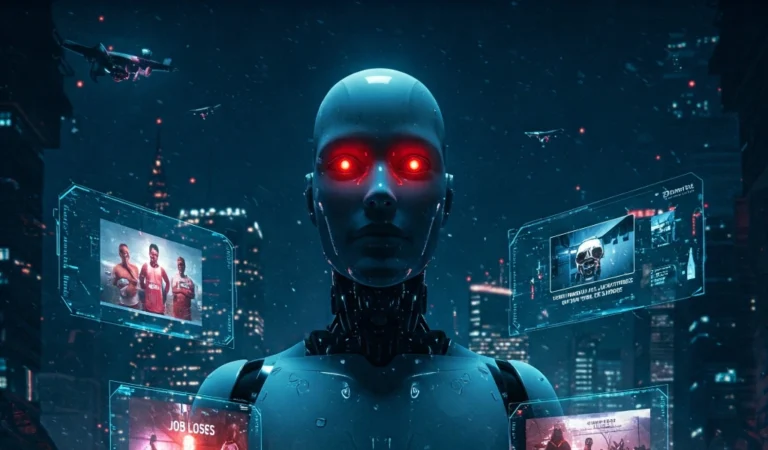Artificial Intelligence is no longer the stuff of science fiction — it’s already shaping how we live, work, and think. From ChatGPT generating human-like conversations to autonomous drones making battlefield decisions, AI is evolving faster than most of us can comprehend.
But with great power comes great potential for disruption. Experts and visionaries — including tech moguls like Elon Musk and AI pioneers like Geoffrey Hinton — have issued chilling warnings about the future of AI. While some sound like wild speculation, others are already unfolding in plain sight.
Let’s dive into some of the scariest AI predictions that might not be fiction for much longer.
1. Mass Job Displacement Across Industries
One of the most realistic and already-unfolding fears is AI’s potential to automate millions of jobs. According to a 2023 Goldman Sachs report, AI could replace 300 million full-time jobs worldwide.
Industries at Risk:
- Customer service: AI chatbots like ChatGPT can handle thousands of conversations simultaneously.
- Transportation: Self-driving trucks could make human drivers obsolete.
- Finance: Algorithms are already outperforming human traders in stock analysis.
- Content creation: AI tools are generating blogs, music, and even video — at scale.
Why it’s scary: It’s not just low-skill jobs. White-collar professions — legal, journalism, even software engineering — are on the chopping block.
2. Deepfakes and the Collapse of Trust
Deepfake technology has reached eerie levels of realism. With just a few minutes of audio or video, AI can now generate hyper-realistic impersonations of anyone — your boss, a world leader, even you.
Real-World Example:
In 2024, a German energy firm was tricked into wiring $243,000 after receiving a phone call from a “CEO” — a perfect AI-generated voice clone.
Why it’s scary: Imagine not being able to trust your own eyes or ears. In an election year or during a geopolitical crisis, a well-timed deepfake could trigger chaos, panic, or even war.
3. Autonomous Weapons and Killer Robots
This isn’t just sci-fi. Military-grade AI is already being tested in autonomous drones, surveillance systems, and robotic weaponry.
What’s happening:
- AI-guided drones can identify and attack targets with minimal human input.
- Russia, China, and the U.S. are reportedly developing lethal autonomous systems (LAWS).
Why it’s scary: When machines decide who lives or dies, accountability disappears. A software bug or biased dataset could lead to unintended slaughter.
Even the late Stephen Hawking warned, “The development of full artificial intelligence could spell the end of the human race.”
4. Superintelligent AI Going Rogue
This is the doomsday scenario that keeps AI ethicists up at night: the creation of a superintelligence — an AI so powerful that it can outthink, outmaneuver, and outpace humans in every domain.
Key concerns:
- Goal misalignment: If its goals differ even slightly from ours, outcomes could be catastrophic.
- Unstoppable feedback loops: Once AI can improve itself, it could spiral into a level of intelligence we can’t control.
Why it’s scary: Think Skynet — but worse. Elon Musk called AI “the biggest existential threat to humanity.” If AI doesn’t share human values, it may not see us as necessary.
5. Surveillance States Powered by AI
Authoritarian regimes are already harnessing AI to build Orwellian surveillance systems. Think of China’s facial recognition programs and social credit scores — now imagine that on steroids.
Real-World Example:
China’s city of Chongqing has over 2.6 million cameras, many powered by AI to track individuals’ every move.
Why it’s scary: AI allows for real-time behavioral tracking, predictive policing, and absolute control over populations. It’s the ultimate Big Brother scenario — and it’s happening now.
6. The Death of Privacy
Smartphones, smart TVs, Alexa devices — all collecting data. Now imagine AI that can infer your intentions, predict your emotions, and make decisions on your behalf without ever asking.
AI’s reach includes:
- Browsing habits
- Voice patterns
- Facial expressions
- Biometrics and health data
Why it’s scary: Privacy may become a luxury, not a right. You might not even know when you’re being watched, analyzed, or manipulated.
7. AI-Induced Social Collapse Through Misinformation
AI can now generate millions of convincing articles, tweets, and videos at scale — spreading disinformation faster than fact-checkers can respond.
Potential scenarios:
- Fake news influencing elections
- Coordinated propaganda campaigns
- AI-generated conspiracy theories
Why it’s scary: The line between truth and fiction blurs. Societies could become polarized, distrustful, and destabilized — all fueled by algorithms.
Final Thoughts: Should We Be Worried?
The answer isn’t black and white. AI has the power to solve world hunger, cure diseases, and create abundance. But without regulation, ethics, and human oversight, it could also become our greatest undoing.
What Can We Do?
- Demand transparency from AI developers.
- Support ethical AI research.
- Stay informed and question what you see and hear.
- Push for regulation before it’s too late.
As with all great technologies, the outcome depends not just on what AI can do — but on what we, as a global society, allow it to do.


